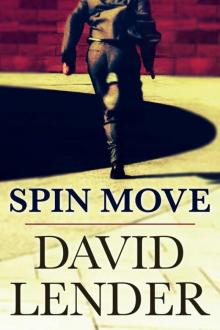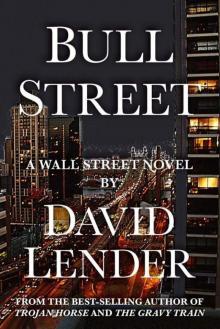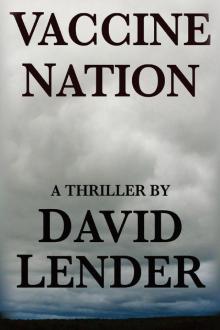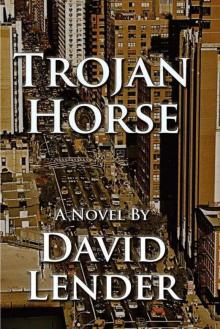- Home
- David Lender
Bull Street (A White Collar Crime Thriller) Page 2
Bull Street (A White Collar Crime Thriller) Read online
Page 2
Richard laughed. Not a nervous one because he was freaked out that he was actually bullshitting with the most famous guy in finance. He just laughed because it was funny, Milner telling him to call him Harold, putting him at ease, joking around. Not some stiff, but a regular guy.
They were still shaking hands, Richard laughing, when Jack Grass and Mickey Steinberg walked up. There he was, standing among the guys who’d done 15 major deals together over the last 20 years, not including scores of financings, refinancings, divisional divestitures and add-on acquisitions; a mini industry, the three of them.
Richard heard Jack and Mickey greet Milner, saw them shake hands, exchange a few good-natured barbs. But not clearly, not like it was real, because he was now somehow out of his body watching from a distance. He zeroed in on Milner, larger than life again. The casualness that said he didn’t need to make an effort to impress was still there. Now Richard took in Mickey, Walker’s genius in Mergers and Acquisitions, with frizzy Jewish hair, sleepy eyes, who droned on in a monotone. Mickey was probably laying out some wisdom, because Milner gave him his complete attention, nodding as Mickey spoke. Now Richard studied Jack, the firm’s Chief Executive Officer. Jack stood smoothing the peaked lapels on his European-inspired suit, looking artfully put together from his French tie and matching pocket square down to his Italian loafers. Jack’s eyes moved around like a big jungle cat’s. Watching Milner, taking in everything, now sizing up Richard, now back to Milner and Mickey. His athletic build showed in the close-fit suit, shirt cuffs protruding Cary Grantlike from his sleeves, hair razor cut, Palm Beach tan standing out against his white collar and cuffs.
They walked into the conference room, Milner smiling and lifting a hand in a restrained wave good-bye to Richard. Jack Grass saw it and glanced back at Richard, seeming to make a mental note.
Richard looked into the open door of the conference room. A mahogany table was set for three, bedecked with crystal, china, formal silver and fresh linen. Its subdued sheen and worn edges showed graceful age, complemented by the oriental rug it sat on. The aroma of rosemary and eggs mixed with some other scent he couldn’t identify emanated from an unseen kitchen.
Richard wished he could listen in on their meeting, be in the room with them. Hell, he wanted more than anything to be one of them, particularly Milner. He was a big part of why Richard was here.
Just as they sat down at the table to breakfast, a trim man in a double-breasted suit walked into the reception area with an air that he owned the place. Richard took him in: slicked-back hair, pocket square that matched his bold Hermes tie, English-striped shirt with white cuffs showing below his jacket sleeves. A Jack Grass wannabe? He walked erect, lips pursed, projecting arrogance. LeClaire, no doubt. He’d be the most important person in Richard’s life for the next hour.
“François LeClaire. Sorry I am late.” He smiled, but modestly, as if to overdo it would wrinkle his suit. His accent had the exaggerated edge of a cartoon character, almost too pronounced to be real. “Conference call to Europe. Unavoidable,” now adopting a manner like Richard, of course, knew the import of all this. He shook Richard’s hand like he wanted to leave no doubt that he understood the concept of a firm American handshake. He extended his other hand in the direction of the offices with the formality of a Swiss hotelier.
Here we go. Richard resisted the urge to peek back at Milner.
Harold Milner looked down at the rosemary and goat cheese omelet on his plate, then at his hands; the meaty hands of a carpenter or mason. But for some turns in his life, that could’ve been him. It was something he tried hard never to forget. He couldn’t help laughing at himself now: he was uneasy, and trying to hide it. He’d been at the deals business a long time. Lots of tense moments, tough deals, pressure. But he rarely felt like this.
He looked over at Jack and Mickey. They sure took Milner back. Twenty years of dreaming, manipulating, trial and error, making it work. Elbow to elbow, the three of them. Jack, the ideas guy, sitting there now, puffing and blowing, preening himself in that $5,000 custom suit. Mickey the planner and thinker. Jack should thank God he had Mickey. He made Jack’s schemes real. And it really wasn’t just Mickey’s brains and technical mastery; it was Jack’s crazy ideas, because without Jack’s dreaming Mickey wouldn’t have had anything to breathe life into.
Before he met these two he was just a scrappy guy doing pintsized deals. Then he met Jack, and a month later, this new guy he had in tow, Steinberg—Mickey, not a nickname for Michael, just Mickey—short, plump and unathletic. They both showed up at Milner’s New York office in that dowdy building he’d started out in at 8th Avenue and 34th Street. Smelled like the Chinese restaurant downstairs. Jack grinning his golden-boy grin in a $2,000 English-cut suit, still only 31 years old and Walker’s top producer, already running the firm’s Corporate Finance Department. Mickey blinking slowly, shaking hands more firmly than Milner expected from someone with that weaselly face and punchdrunk demeanor.
Jack pitched the Caldor idea almost before they sat down, itching to get at it. Jack talking nonsense about buying a billion dollars of debt owed the retailer Caldor by its credit card customers for 20 cents on the dollar. Mickey explaining that Caldor was near-bankrupt and desperate for cash. Jack saying Caldor’s credit card customers would ultimately pay their bills, Milner would make a killing. Mickey laying out how to finance the deal. Back and forth, Milner’s eyes shooting from one to the other like at a tennis match. Then Jack telling Milner all he had to kick in was $10 to $12 million, maybe make 20 to 30 times his investment in a few years. Milner thinking, that got his attention, who ever these guys were.
It had turned out to be a recipe for an incredible home run: Milner had invested $16 million of cash, almost all he had laying around, and borrowed the rest to buy Caldor’s credit card receivables. After paying off his lenders in two years, Milner had netted $455 million. Jack and Mickey had propelled Milner into the big time. Within a year he bought a Learjet and apartments in New York, Palm Beach and Los Angeles. He moved his office to the penthouse of the Helmsley Building; the anchor of the 45th Street entrance to New York’s power alley business district on Park Avenue. And that had only been the beginning.
But now, this was the end.
“I wanna do a deal on Southwest Homes,” Milner said.
He saw Jack perk up across the table like a dog sniffing a bone. Mickey was characteristically quiet, eyes blinking. Milner sipped his water, swallowing hard without worrying about that crinkly sound he made. One of the keys to his humble roots that Mary Claire always cast him a disapproving eye about at dinner parties. He didn’t have to try to impress these guys.
Mickey said, “Mind if I ask why?”
Milner saw Jack look sideways at Mickey, as if to try to shut him up.
“I don’t like the business anymore. Any schmoe who can sign an X on a mortgage application can buy a house he can’t afford.”
Jack said, “Yeah, a real bubble mentality.”
Milner nodded.
Jack said, “This round of musical chairs won’t last very long. Better pick your seat before the music stops. Remember when the Internet stock bubble popped?”
Milner felt himself smile beneath his hand, knew it was showing in his eyes. This was Jack at his best: always selling. Milner would miss Jack and Mickey in a way, but they’d become his chaperones on a trip to the dark side. Churning out deals together that just moved pieces around on the table; they were all making piles of money but not creating anything. He’d made a commitment to himself that he’d go back to building companies again, not this “financial engineering on steroids” crap the magazines lauded him for. Even that kid in the lobby only talked about his deals that busted up instead of built things. Milner looked over at Mickey. “Mickey, whattaya think?”
“You want to sell it to a corporate buyer, or do an initial public offering?” Mickey asked.
“Take it public—the IPO.”
“The IPO market’s still shootin
g out deals like a baseball pitching machine,” Jack said. “And homebuilding stocks are red hot.”
“Everything’s hot. Maybe too hot,” Milner said.
“Yeah, white hot. All the more reason to unload a chunk of Southwest onto the public,” Jack said.
Why did Jack make even the right answer sound like bullshit half the time?
Mickey said, “It’s worth about $1.5 billion. How much do you want to sell?”
Milner put down his fork, rested his elbows on the table and put his hand over his mouth, taking his time. He glanced over at Jack and saw him observing. Milner said, “All of it.” He saw the muscles in Jack’s jaw flex. Then he saw Jack inhale, sensed the animal arise beneath that bespoke tailoring. Okay, Jack—ready, shoot, aim.
“We can sell 100%,” Jack said. “A number of 100% IPOs have gotten done lately. And with home prices setting new records each month, and getting a mortgage as easy as eating popcorn, the public markets are bidding up homebuilders’ stocks like crazy.”
Milner said, “I’ve noticed.” He looked at Mickey.
Mickey said, “In general, Jack’s right. But if you sell it all in the IPO you’ll take a major discount versus selling, say, half. If you sell it all, people ask: ‘What’s wrong with it that he doesn’t want to keep any?’”
“I know. But I like the idea of selling it all. How big a discount would I take?” Milner felt his stomach tighten.
Milner saw Jack and Mickey take time to look at each other. Milner felt himself smiling again. He had to admit he loved watching these guys, had since the beginning. Back and forth. Jack trying to urge Mickey with a glance and body language, Mickey considering his answer, blinking, contemplating.
Mickey said, “I’d say at least $300 million.”
Jack didn’t move.
Milner shrugged, then nodded. “Done.”
Jack looked over at Milner with his best shit-eating grin.
Milner looked down, observed his hands again. In a way, he’d get to be a carpenter after all. And put in an honest day’s work.
In LeClaire’s office, Richard settled into a reproduction of the Chippendale antique chairs in the lobby. He looked around. It was a real office, not some eight-by-twelve hole. Mahogany desk and credenza, Oriental rug, textured fabric wall covering and tasteful print curtains. LeClaire was a Senior Vice President, which had its status, but his title aside, what Richard had heard was right: Walker, privately held, still had the appointments of an old Wall Street firm that even Goldman Sachs and Morgan Stanley had given up years ago.
Richard hoped to exchange some small talk, loosen himself and LeClaire up. He checked out LeClaire’s desk. The guy was a neatnick, ordered piles of documents on either side, more on his credenza. A pencil holder with a dozen or so sharpened #2s. Pictures of his wife and it looked like three kids.
“Can we get right to it? I’ve got another conference call in an hour and I need to prepare before it,” LeClaire said.
“Sure,” Richard said. This is it; don’t blow it.
LeClaire held up Richard’s resume. “Here is what this tells me: nice middle-class kid from the Midwest; public high school, including the obligatory sports. Undistinguished undergraduate school—Michigan State was a choice I would like to understand—then on to a successful career track in advertising…how am I doing?” His thick French accent had a cadence that emphasized the syllables on the up-beat.
“Okay, you’re getting to the part that should be more interesting to you, I…”
LeClaire talked over Richard, “You say you had some successful campaigns. ‘Wow! What a Whopper,’ ‘Morton steak sauce sizzles!’ and the Michelin tire ‘Baby’ campaign—I do not recognize any of those. And you won some award.”
“A Clio isn’t just ‘some award.’” That was like saying Institutional Investor’s “Deal of the Year” award was like a gold star in grammar school. Who does he think he is?
LeClaire now put Richard’s resume down on the desk and looked at it. “But it was not sufficient to achieve one of the top American business schools that Wall Street gets its real talent from. Do you disagree?”
“I see a different picture. A hardworking kid with solid Midwestern values excels in public school…”
LeClaire interrupted, “Have you ever met anybody from your American boarding schools?”
“A few, but…”
“It is my experience that they are better educated.”
The hell they are. Could this guy be more of a stiff? “Public schools teach people how to think, too. Besides I’ve met some boarding school types who may know how to say the right thing, but haven’t had an original thought in their lives.”
“Point taken. So why are we here, thinker?” He was sitting up straight in his chair, hands clasped and resting on his desk blotter.
Richard leaned in toward him for emphasis. He felt himself starting to breathe faster. “Because I gave up a promising career in advertising…” He heard his voice rising.
“How much were you making?”
“A hundred and twenty thousand.”
“That is considerable for advertising. They pay poorly.”
“I know. I was worth more. But I still gave that up to—”
“To crunch numbers until 2:00 a.m. most nights, put together pitch books for people like me you will perhaps learn to hate, and if you are very, very lucky, carry bags for senior officers such as Jack Grass and Mickey Steinberg?”
“No, to learn the business. To be like Jack Grass or Mickey Steinberg, or if I can pull it off, like the guy they’re outside having breakfast with, Harold Milner.”
“That is ambitious.”
“I am ambitious. And Milner’s only one of the deals guys I studied who got me interested in this business.”
Richard realized he had leaned in so far forward that his hands were on the edge of the desk.
“Today it is my job to see if you are ambitious enough.” LeClaire slouched in his chair and smiled for the first time.
Richard now felt perspiration on his upper lip and realized his pulse had quickened. He used the pause to settle back into his chair. He’d let this guy get under his skin right away and he was disappointed in himself. Calm down, this isn’t gonna get it done. You need to get past him. He smiled back, then tried to lighten it up. “So did I get past the first hurdle?”
“You did that two weeks ago.”
Richard raised his eyebrows as if to ask how.
“You beat down the door.”
“I guess I was a little persistent. It took a few calls.”
“Six. So, my young friend, let’s talk.”
This time he smiled like he wasn’t afraid it would make him soil himself. Maybe it meant LeClaire had just been testing him. But “my young friend?” Gimme a break. The guy was barely 35. At least he didn’t call me “old sport.”
Then he said, “You know what? I have time. Would you like something to drink?”
“Coffee would be great.”
LeClaire seized the phone handset and chattered in staccato French to someone named Marcel. He turned back to Richard. “So how is it going?” Now warm, like they were colleagues. Richard couldn’t figure this guy.
Richard said, “I haven’t got the job offer I want and it’s mid-March. Two fallbacks. Corporate finance offers from BFGoodrich and Procter and Gamble. Good jobs, but backups.”
“Why do you think that is?”
“You said it yourself. My resume doesn’t fit the mold and I didn’t go to a B-school that’s a main Wall Street feeder.”
“Your resume has neither a comfortable, aged patina nor crisp, institutional packaging.”
Richard chuckled at that. “That’s one way of putting it.”
LeClaire laughed, too. “Something I wrote down from an article on recruiting. It sounds even stupider said aloud than read.” Finally starting to let his hair down? LeClaire said, “You have no idea how sick I am of seeing these pretty boys come in here and fill me full of
perfectly useless theories and impractical business school nonsense.” His face softened, like he really was loosening up.
LeClaire continued, “But when it comes down to this business, real financiers feel something in the pits of their tummies when they think about money and bonds and stocks. That has nothing to do with business school theory.”
Somebody knocked on the door. “Who is it?” he called.
“Marcel,” came the answer in heavily accented English. A demure woman in a white outfit entered and served them from a tray. It was real china. Richard took a long, grateful swallow of coffee and noted that LeClaire had chosen tea. LeClaire seemed to go someplace else as he took his first sips. He turned and admired the photos on his credenza.
“Three kids?” Richard asked.
LeClaire swung back, looking like he’d been caught. “Yes. Girls. For years I did not bring any pictures of my children to the office because I was afraid I would never get any work done. I thought I would just spend all day staring at them.” He seemed embarrassed, then straightened his back and went on, “When I said institutional packaging earlier, I meant, of course, the right Ivy League undergraduate school, then two to four years of an Analyst position at an investment bank, prior to attending one of the top business schools.”
“Uh-huh.” Richard was wondering where this was going.
“Let me tell you my primary role as head of recruiting. The elite schools are easy. The recruiting infrastructure, the inertia takes care of itself. My real job is to research people from the second-tier schools, ferret out the good ones and convince them to join us. Are you one of the good ones?”
Of course he was. But how to convince this guy?
The more Jack watched Milner, the stranger he thought he was acting today. It wasn’t like him to just blurt out that he wanted to IPO Southwest like he did. Milner was anything but impetuous. And if Jack didn’t know better, he’d say Milner was actually nervous. He’d never sold anything on this scale before. Hell, it was 15 to 20% of his empire, and he’d sell at a discount, no less. What was up?

 Arab Summer
Arab Summer Sasha Returns
Sasha Returns Spin Move
Spin Move Bull Street (A White Collar Crime Thriller)
Bull Street (A White Collar Crime Thriller) Vaccine Nation
Vaccine Nation Trojan Horse
Trojan Horse